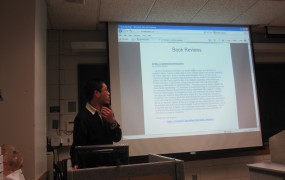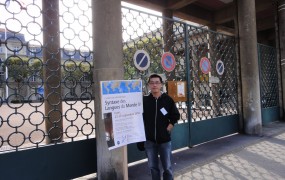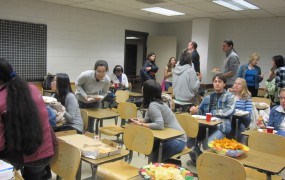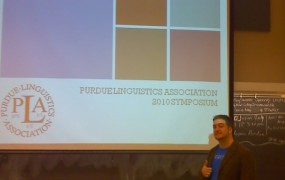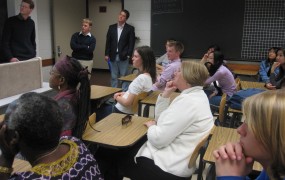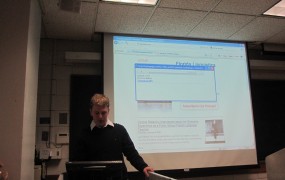Phonology and I: El amor en los tiempos de consonantes
Wednesday, September 28th, 2011 @ 9:18PM
–Article by William Sheard
I can still remember the first time we stayed up all night together. Clothed in a shimmering, formal dress, she sat looking at me with a mocking grin. There were two ways to go about this, she said, clearly enjoying the spectacle of my jejune inhibitions. I had to choose the right way. But the important thing was to try. She intimidated me so much, presented me with so many facets of her complex character, that I was reticent even to begin the delicious act of disrobement to attain that naked, underlying form. I dreamed of a suave caress than would remove her dress in one effortless arc of my arm; but I feared my untrained hands would snag and claw at that precious fabric while her grin would broaden in response to my feeble attempts at seduction.
I wondered whether we should stop drinking. I needed to clear my head. And, besides, I was sure that she had already had a few. There should be a rule against drinking – especially at the onset of a relationship. Was I being sanctimonious? How could I impose such Puritanical stricture in the face of her blitheness? I tried suddenly to take her glass away from her. In the half-light of evening her dress danced, its myriad patterns sparkling hypnotically before my eyes, dizzying me with the possibilities they suggested. She swept her hand away quickly, turned her head over her left shoulder in flirtatious coyness, and said: “Deletion will not work.” We both smiled, I with a pained expression of doubt, she with the maddening assurance of one who knows she is being pursued.
I reached for the vodka bottle. One more couldn’t possibly hurt; she agreed. “Alcoholic epenthesis,” she said, “is absolutely essential for the fabric of social life.” I found the way she talked both arcane and alluring. Never before had I met anyone who harbored so many secrets, whose smile sang of so many wonderful surprises. I downed the glass and poured each of us another large measure. I could see that I was going to need it.
“I’m really umprepared,” I stammered. “I mean, I feel…” A process of assimilation was at work, a moving together of two bodies in this restrictive environment, like the meeting of voices from two sides of a nave. I was feeling more at ease even as I expressed my fears. Still, I couldn’t decide whether we were complementary or contrastive; she hadn’t revealed to me enough of herself for me to make up my mind.
“This vodka’s really neutral, isn’t it?” I said, somewhat awkwardly, wanting to bide my time before making any more rules.
“Well, it’s certainly true that vodka leads to neutralization,” she laughed. I blushed. She was so perceptive.
An alternation ensued, she lowering herself on to the sofa, her voice becoming now more breathy, almost voiceless at times. We looked at each other.
“Feed me,” she said.
I had no food in the house. My heart bled for her. I could see that she was hungry.
“I’m sorry, I can’t feed you,” I said. “I have no food.”
“It’s okay. Is not being able to feed me the result of another of your silly rules?” she asked teasingly.
I was pleased to see that my inhospitableness had not offended her. But just as I thought we were moving closer together, she became more abstract. I had been comfortable with our few playful rules and had begun to consider which should come first; which should be considered the more important; even which should apply more than once in case of absolute necessity. After all, setting boundaries was going to be essential if we were to get along. She was quite prepared to talk about boundaries, but kept mentioning the myriad exceptions under which they could be breached. And as she did so her true self – all that was underlying this flirtatiousness of hers – seemed to recede even further. Would she ever be tamed? I asked myself with a sinking heart. Her face was half-hidden by the shadow of the bookshelf and her voice emerged now from blackness: a nasal and liquid flow, riding a hierarchy of sonority, that refused to stop, as she talked about the stress in her life.
“How do you feel about all these stresses?” I asked gently.
“I don’t know. I feel sometimes that they’re so fixed, you know? Like they’re never going to go away. At other times I feel free, like the stress is free. Do you know what I’m talking about? And then I feel that I can reorder my life and, okay, so the stresses might still be there, but they might be secondary to something else. Oh, it’s so hard to explain.”
At that point, I turned on the lamp light to go to fetch another bottle of vodka. On the wall, a portrait of Prince Smolensky stared out at the two of us. The portrait showed the great soldier commanding from horseback in the Crimean War, his face suggesting both boldness and fear. Surrounded on all sides by enemy forces, he had raised his sabre aloft and was declaring his faithfulness to the Russian cause. This interpretation I related to her in the narrative tone people sometimes use to tell such tales.
“Who told you that?” she asked disbelievingly.
“That’s the official version that I read in the Hermitage,” I said, cowed by the critical note in her voice. She had obviously still to overcome the discussion of rules that had seemed so necessary at the time but now seemed like an embarrassing obstacle to true intimacy.
“Sounds plausible,” she said. After several moments of intense reflection, she declared: “You know, I think that’s really an optimal theory…No, really it is.”
As she gazed at me with dreamy, kohl-lined eyes which blended into the darkness of the corner of the room I realized that the onset of this relationship ranked with the best I had known. I smiled at her, wondering whether she would remain as faithful as Prince Smolensky. Or would she add new conditions in the future? That was a marked possibility, but a risk I had to take. And what was to be the conclusion to this evening? I wanted so much for it never to end, for this minimal pairing to attain maximal projection in the realm of bliss.
“No coda!” I said suddenly. “May it never end.” And that was the condition, the single utterance, that won her heart. We sat ourselves at the small, lined table in the middle of the room and entwined our limbs in a matrix of expectation.
She smiled at me through grateful tears, pointing a finger at the portrait of Prince Smolensky. I nodded in mute accord.
“Just promise me one thing,” she said.
“Anything,” I replied.
“No more rules, please.”
We both smiled. Our lips met, contorting our features [+delayed release, +labiodental, +coronal, +long] with pleasure and we sank into each others arms with a feeling that this was going to last.
Posted by floridalinguistics
Categories: William Sheard


